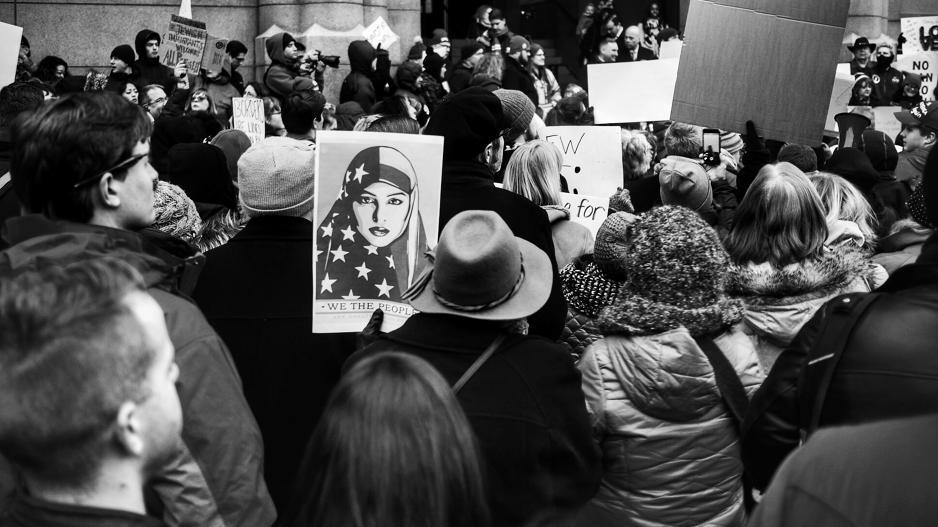Former Google Exec On Why CEOs Should Speak Out Against The Muslim Ban
President Trump’s executive order barring citizens from seven predominantly Muslim countries from entering into the U.S. has caused a lot of pushback. Hundreds of thousands of people took to both the streets and airports to protest the order this week. Lawyers worked tirelessly to help travelers enter the country. Leaders around the world denounced the policy.
The response from the business community has been mixed. While some CEOs have come out strong against the ban, others have given pat, noncommittal statements, while still others have remained noticeably silent.
Laszlo Bock, Google’s former HR head who left the company last July, felt an imperative to take a strong line against the ban. He took to Twitter Sunday night to call for other leaders to follow suit:
I spoke with him to hear more about his thoughts on the executive order, his background as a political refugee, and what leaders should do in these strange times.
What follows is a transcript of our conversation. It’s been edited for space and clarity.
Can you give a little bit of background about the tweets you sent, and why you sent them?
It’s important to speak against the kind of trend in our culture to disregard the rights of people who are just as human as any of us. As somebody who worked hard and has been fortunate to end up in a position of some authority, status, and power, it’s particularly important that I and people like me use our voices. I feel I have a responsibility to say something if something is wrong. You can’t stand by and watch that happen.
Can you talk a little bit about your background as a Romanian refugee?
My father’s first memories are from 1945 in Romania, hearing on the radio that “the Americans are coming . . . the Americans are coming.” Eventually the communists took over Romania. For his entire life he wanted freedom—freedom of assembly, freedom of speech, freedom to think and do what he wants, freedom of religion. All these things weren’t allowed under the communist regime.
In the early ’70s, when I was quite young, (my brother and I) had tourist visas to go from Romania to Czechoslovakia for vacation. And instead my father and my mother took us to the border of Austria, and we snuck across the border and applied for political asylum in a refugee camp in Austria. And that refugee camp is still there, housing Syrian refugees, today. From there we applied for refugee status from the United Nations, and then came to the United States. And then both my parents started their own businesses. My brother started his own business. They employed lots of people.
I went into technology, because in business school I observed that technology is an industry where there’s not a premium placed on lots of experience. You don’t have to have 20 or 30 years’ experience to have an impact and get up to speed because the field changes so quickly. And I wanted to be part of something dynamic. Eventually I got recruited by Google to lead People Operations.
Do you think that tech companies specifically have an imperative to respond to what’s happening right now?
I don’t think tech companies are alone in having an imperative to speak out when things are happening that are wrong and unjust. From a self-interest perspective, in the long term, it’s in their interests to actually make sure there is freedom—both in terms of markets, but also in terms of how people can behave and act. Innovation and creativity come from the freedom to have lots of ideas; it comes from having people literally from all over the world bringing their best ideas to this country.
In a way, one of the most insidious things that’s happening is the current administration is sending a tremendous signal to the rest of the world that the best, smartest people should not come to America. John Doerr [of the Kleiner Perkins venture firm] famously said that everybody from a foreign country who gets a PhD in the U.S. should get that PhD with a green card stapled to the back of it. Today, the best, smartest, most creative people—and by the way, this is true of any job, not just for white collar jobs; the people who come here and end up as landscapers—are also people who are incredibly hard working. They take enormous risks. They come here to work hard, to have a positive impact.
I think it’s easy to look at the tech industry and say, ‘Well, they have a special link because they employ a lot of people who come from other countries.’ But there’s a couple problems with describing it that simply. That’s absolutely true for the tech industry—but the agriculture industry employs a tremendous number of immigrants; the automotive industry, financial services, employ a lot of immigrants. They all have an interest in this particular issue, as well as a lot of other political issues.
Do you think there’s a double standard with tech companies being asked to respond, compared to other industries?
First, credit where it’s due: Howard Schultz put out a pretty bold statement to his employees, this beautiful letter that talks about how they’re going to hire 10,000 refugees in the next five years. I think that that is tremendous leadership. That said, yeah there’s a difference.
The tech industry seems to be more vocal on this and a lot of other issues. And it’s important that the tech industry be vocal about it.
I can draw a parallel to roughly four or five years ago at Google, when the decision was made to start disclosing diversity numbers, and the rest of the industry followed suit. [editor’s note: Google first released its diversity report in 2014; the only company of a similar size to release data earlier is Intel.] And ever since, there’s progress made, but not as much as people would like—not as much as I would have liked when I was in that job. [Now] the industry gets beat up for not doing enough on diversity.
I’m impressed that the tech industry is weighing in on this issue, just like I’m impressed that Howard Shultz and Starbucks are weighing in on this issue. It’s a shared issue across lots of organizations, large and small, and just like the diversity issue, when you look beneath the covers, every company has the same issues.
As a company, there are clear incentives not to speak up because you don’t want to get pilloried in the press. You don’t want to offend whatever regulators there might be. And you draw attention to by speaking up. But the fact is, on the diversity issue, the tech industry has made slow and modest but real progress in a way that has not happened in other industries. And on the issue of immigration, the industry needs to keep pushing in that direction.
On the issue of immigration I expect to see the same. And it would be amazing if other industries that had exactly the same interest and perhaps even the same set of values spoke up in a similar way.
And, by the way, it’s what their employees want. This is driven by people in the companies saying, ‘I want to work for this kind of company.’ Another layer of self-interest is, if you’re a company that wants to keep the best people—even if you don’t care about immigration—the best people generally want to work for companies that do care about these kinds of issues. And they’re going to end up there.
So what’s next? We have this executive order, people initially responding. What do business leaders do now?
I think there’s a set of business leaders who have the ear of the administration or have connections and influence. And they should use that to have a positive, constructive conversation and try to end up in a more sensible, realistic place. It’s important to make public statements because it sends a signal to the rest of society about what’s important. And silence sends a signal about what is not important. It’s important for companies to take care of their own people. And it’s important for them to support efforts to advance not just what’s right, but also what is in their own business interest in the long term, and in the interest of their employees.
They do that by [making] donations to nonprofit organizations. I know a lot of people who are attorneys who are volunteering time, doing a tremendous amount of pro bono work. There’s a lot that can be done. The human beings being held at airports who legally are entitled to representation, they should be afforded representation. And for a large company, it’s a rounding error if people take a day off to help with this kind of thing. It’s a lot of small, incredibly meaningful ways to provide support.
Anything else you think is important to mention?
The one other thing is [that] obviously there’s always a wide range of issues that companies care about when it comes to their relations with the government. There’s trade issues, there’s security issues, privacy issues. There’s a lot of issues. And organizations tend to be pretty thoughtful about weighing on which issues are the most important. And they also have to walk a very careful line around serving all of their customers. And for every organization, they have customers from every political belief, every orientation, every religion. So you need to be thoughtful about focusing on your business and making sure you are in touch with all of your customers.
But this question of immigration is a relatively straightforward entry point for organizations. It’s a discussion that is pretty tightly tied to their businesses. There’s others like trade and free speech, freedom of the press, freedom of assembly, that don’t have as an immediate day-to-day impact on a business’s operation, but have much more profound implications on long-term operations. Organizations should be thoughtful about when they want to weigh in on all of these issues. But sooner is generally better, because even though it’s difficult for companies, it’s relatively easy compared to others to weigh in on the question of immigration or work visas or refugees.
Note: An earlier version of this story mischaracterized Bock’s family’s immigration timeline.
Fast Company , Read Full Story
(12)



